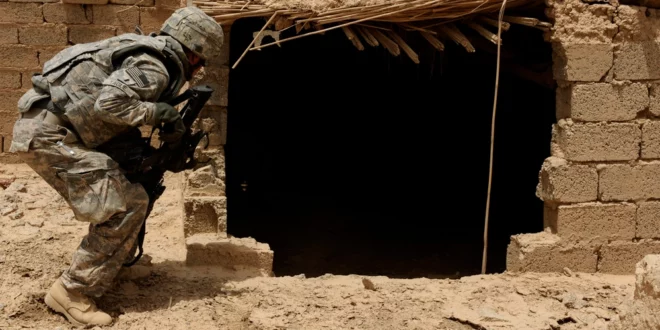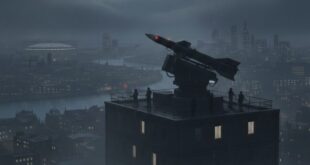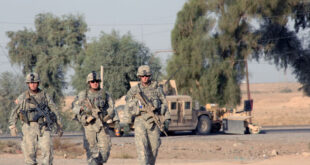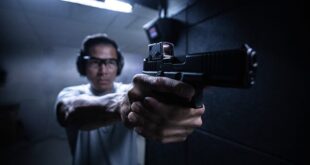by Cliff Wade
Iraq, 2006
We found ourselves in the home of an Iraqi family during a massive clearing operation in an area characterized by terrain varying between urban landscape, farmland, palm groves, and small villages. We had been clearing routes of improvised explosive devices all morning. We had been using our Bradley Fighting Vehicles to knock over walls surrounding palm groves that the insurgents used to conceal their movements, and from behind which they would hurl hand grenades at passing Iraqi Army and Police patrols.
The home was in a village I would become very familiar with once we’d established a combat outpost nearby, and through which our line of communications would travel. It was a predominantly Sunni area, and there were a few walls with Islamic State of Iraq graffiti spray painted on them. This family’s house had the heart symbol with an arrow through it, with three lines of Arabic in the heart; a staple of jihadi “street artists.”
I have no clue what the Arabic said, or what the symbolism of the heart with the arrow through it signified; but we, along with our Iraqi Army counterparts, who were almost 100% Shiite, moved into the house and started to interrogate the occupants immediately. We had just uncovered an IED comprised of two Italian anti-tank mines and a couple mortar rounds crudely taped together in the palm grove a hundred meters or so down the road, so we had questions for the occupants.
I stood outside the front door while the IA pulled a man out from inside the home into the courtyard. He was probably in his early twenties. He was followed by a woman, about the same age, wearing a black abaya that covered everything but her face. She was clinging to an infant, probably only a few months old. An older woman, who I took to be the infant’s grandmother, followed behind her. The man pleaded in Arabic while the IA soldiers shouted at him.
I didn’t need to be fluent in Arabic to understand that the IA wanted to know why the wall surrounding his home had Islamic State graffiti on it and why his entire neighborhood was littered with bombs. The man shook his head and was obviously denying any affiliation with the terror group, but the IA didn’t seem convinced.
The women were frantically shouting, pointing outside the compound, and pleading with the IA, who physically restrained them from getting near the man. The man took a smack on the face from an IA soldier, and the women grew even more hysterical.
The mother, who was strikingly beautiful, moved towards me. While still clinging to her infant, she started pleading with me in Arabic far too fast for me to comprehend. She clearly wanted me to intervene, but I did nothing. As far as we were concerned, this was the type of governance we had hoped to establish; with local nationals solving local national problems. At least, that’s what I told myself then.
The grandmother became downright irate, and began to swing her fists at an IA soldier who simply dodged her and laughed, which only made her even angrier still.
The IA soldiers dragged the man around the corner of the house, out of sight of the women, and us, and began to beat him. I heard the distinct sound of rifle butts striking body parts, and heard the man cry out and go silent.
The mother handed the infant to the grandmother and dropped to her knees at my feet, begging me to do something. Tears were streaming down her face. She stared up at me from brilliantly bright, caramel-colored eyes, imploring me to help.
I repeatedly said “I’m sorry” in Arabic.
She began to kiss my boots.
I asked her to stop, and I started to plead with her, asking her to please get up, trying my best to reassure her.
But it didn’t help. She continued to sob at my feet as the IA dragged the man from the compound. She cried out and reached for him, but he was already only half-conscious. They put him in a Humvee and drove him away, leaving behind the two women and the baby, all wailing in total despair.
We left the compound, and continued our clearing operation. I have no clue what happened to the man. There is no way to know if he were a member of the Islamic State or merely an unlucky civilian whose house happened to get tagged by a jihadi graffiti artist. My gut tells me he was the latter.
Over the countless hours I would later spend pulling security on our line of communication, I never saw the mother, or the man, again. But I will never forget her face, or her tears, or her futile attempts to beg for what was, in all likelihood, the life of her husband.
 Soldier of Fortune Magazine The Journal of Professional Adventurers
Soldier of Fortune Magazine The Journal of Professional Adventurers






